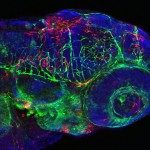Link to Pubmed [PMID] – 21093318
Immunity 2010 Nov;33(5):736-51
Whether the recently identified innate lymphocyte population coexpressing natural killer cell receptors (NKRs) and the nuclear receptor RORγt is part of the NK or lymphoid tissue inducer (LTi) cell lineage remains unclear. By using adoptive transfer of genetically tagged LTi-like cells, we demonstrate that NKR⁻RORγt(+) innate lymphocytes but not NK cells were direct progenitors to NKR(+)RORγt(+) cells in vivo. Genetic lineage tracing revealed that the differentiation of LTi-like cells was characterized by the stable upregulation of NKRs and a progressive loss of RORγt expression. Whereas interleukin-7 (IL-7) and intestinal microbiota stabilized RORγt expression within such NKR-LTi cells, IL-12 and IL-15 accelerated RORγt loss. RORγt(+) NKR-LTi cells produced IL-22, whereas RORγt⁻ NKR-LTi cells released IFN-γ and were potent inducers of colitis. Thus, the RORγt gradient in NKR-LTi cells serves as a tunable rheostat for their functional program. Our data also define a previously unappreciated role of RORγt⁻ NKR-LTi cells for the onset or maintenance of inflammatory bowel diseases.

